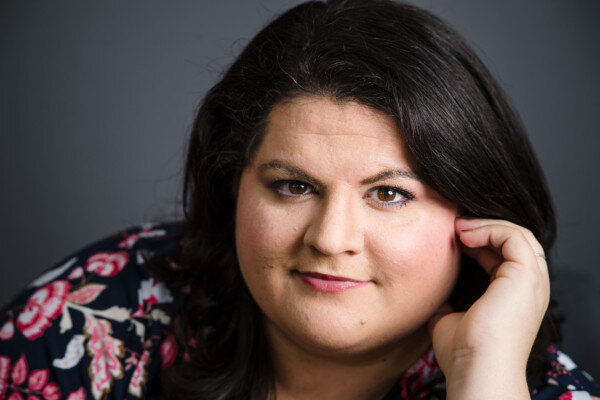Food Psych #206: Mindfulness, Boundaries, Social Media, and Sharing Your Story with Rachel Estapa
Plus-size-yoga teacher and wellness coach Rachel Estapa returns to discuss why mindfulness is a tool rather than a be-all-end-all, how seeking validation on social media mirrors seeking weight-loss praise, how to balance vulnerability and boundary-setting when sharing your lived experiences, the role of forgiveness in healing from diet culture, and so much more! Plus, Christy answers a listener question about how health and wellness professionals can handle concerns about potential clients getting “scared off” by the anti-diet approach.
Rachel Estapa, founder and CEO of More to Love, is passionate about empowering people to love and appreciate their bodies. Her own path to body acceptance began many years ago. After yo-yo dieting throughout her teenage years and into adulthood, Rachel took stock of her life and realized she wasn’t happy. Even when she reached her “goal weight,” she felt something was missing. That’s when she decided she would stop trying to change her body and instead she would focus on loving the body she has. Find her online at: MoreToLoveYoga.com
We Discuss:
How Rachel is working to make yoga more inclusive towards people in larger bodies with the support of large institutions
Challenging the Western stereotype about how a yoga teacher should look
The ways in which Rachel is working to take diet culture out of corporate wellness
How progressive movements are starting to include fat acceptance and examine weight stigma
Why sharing your experiences is powerful
Why we are still learning what “wellness” means
Balancing vulnerability and boundary-setting when sharing your lived experiences
The importance of staying true to yourself while teaching self-love
The ways that visibility and a social media presence affects our self-image
How to avoid feeling resentful toward your passion as an entrepreneur
The link between productivity and diet culture
Why self-care shouldn’t be about doing something for the praise of others or having a grand retreat
How seeking validation on social media mirrors seeking weight-loss praise
The pressure to perform when working against diet culture
Mourning the loss of diets and what they offered
How to create boundaries around your personal journey and what you choose to share
Having patience and hope while on your diet-culture recovery journey
Ways to share your message without requiring the audience to “obey”
Staying grounded and engaging in self-care while sitting with anger toward oppressive systems
Why mindfulness is a tool rather than a be-all-end-all
Using yoga to cope with mental chatter
How Christy uses thoughtfulness and reflection to decide what she shares on social media and in her brand
The role of forgiveness in healing from diet culture
Resources Mentioned
Some of the links below are affiliate links. Affiliates or not, we only recommend products and services that align with our values.
Submit your questions for a chance to have them answered on the podcast!
My online course, Intuitive Eating Fundamentals
Help spread the anti-diet message by subscribing to the podcast
Pre-order my forthcoming book, Anti-Diet: Reclaim Your Time, Money, Well-Being, and Happiness Through Intuitive Eating
Rachel’s first Food Psych® interview
Listener Question of the Week
How can helping professionals present an anti-diet approach without “scaring off” potential clients? How can a health professional tell when a potential client is ready for intuitive eating? Why is it not appropriate for a health professional to offer both weight management and intuitive eating? What are some of the unintentional ways that anti-diet professionals may be promoting weight loss? How can health and wellness professionals be clearer in their marketing messaging to attract clients who are ready for intuitive eating?
Resources Mentioned:
Food Psych episode #205 with Lindsay Krasna
Representation Matters (and founder Lindley Ashline’s Food Psych episode)
Master Your Anti-Diet Message online course

